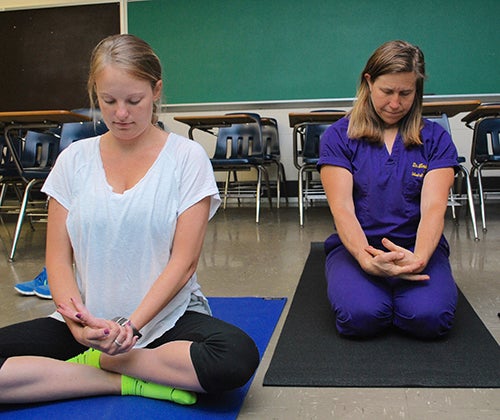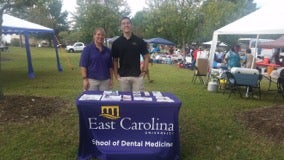Giving baby the best possible start
Many children spend their time with video games and movies rather than a baseball or a jump rope, but maybe it’s possible to give children the health benefits of exercise before they are born.
Dr. Linda May has plans to show that if mothers commit to exercising during their pregnancies, there can be long term health benefits for their children.
Dr. May is an assistant professor of anatomy and physiology at the ECU School of Dental Medicine and an adjunct professor with the ECU College of Health and Human Performance and with the Obstetrics/Gynecology program at the ECU Brody School of Medicine. Her interest in heart health and exercise began at an early age. Her master’s work at the University of Florida was in exercise physiology.
During her master’s program, May learned that Dr. James Clapp, a well respected obstetrician at Case Western Reserve University, was studying the effects of exercise during pregnancy on maternal health. She contacted him with the idea of studying the influence of maternal exercise in pregnancy on child development before and after birth. He helped her get started.
“I jumped at the chance to have Dr. Clapp as a mentor and research partner,” said May, who completed her PhD in physiology at Kent State University.
Working with grant funds from the American Heart Association, May recruits expectant mothers for her research and provides each of them with an exercise plan to follow using facilities on ECU’s campus. Her team works with the mothers three times a week and records their heart measurements during and after their workouts.
Her collaborators in obstetrics and gynecology as well as pediatric cardiology help to record the babies’ heart and body measurements before and after birth.
“We are learning that, yes, generally the babies have improved heart measures, decreased heart rate, and increased variability, which is what most people achieve with a sustained exercise program. I was super excited to discover this when we first started,” said May, who is now in the fourth year of her study at ECU.
The mothers are welcomed back to May’s study after delivering their babies so she and her team can monitor what happens when babies are no longer exposed to mom’s exercise habits.
May and her team of exercise physiology students and interdisciplinary faculty repeat the measurement when the babies are one month, six months, and 12 months of age. The team is finding that in general the babies reflect the positive effects of their mother’s exercise regimen during pregnancy.

Dr. Linda May (at right) guides exercise classes for expectant mothers through the Enhanced Neonatal Health and Neonatal Cardiac Effect Developmentally (ENHANCED) program she heads at ECU.
“This summer, our team tested two- and three-year-olds whose moms had been in our exercise program. We found that the toddlers had maintained the benefits of their mothers’ exercise. They also had below average body fat and above average motor skills, which is very intriguing,” she said.
Winterville, N.C., resident Amanda Dobbs is the mother of two boys, ages three and one. She joined May’s study soon after learning that she was pregnant with the second boy.
“I was quite overweight and inactive during my first pregnancy, and I had a very difficult delivery and a long recuperation,” Dobb’s said, “I knew I had to do things differently during my second pregnancy.”
As a participant in May’s study, Dobbs exercised three times a week beginning in her first trimester until just before her delivery. “The experience with my second son was completely different than with my first baby,” she said. “My labor, delivery, and recuperation were much shorter and easier. In fact, I walked my older son to the park the day after delivering our younger son.”
Dobbs credits the sustained exercise with the easier delivery and recovery. Her second baby remains in May’s study, and the effects of Amanda’s prenatal exercise on his health are still being assessed. Dobbs continues to be very health conscious—both for herself and for her family.
May’s study will follow children as they grow to 13 years of age. Measurements include heart health, fat development, cognitive health, and neuromotor health. She wants to see if the children will continue to be healthier regardless of their interests and level of activity.
May’s goals do not include creating a group of “super babies.” Her main concern is prevention and protection from future disease. As the mother of two boys herself, she was very active during her pregnancies in hopes of protecting her children from the heart disease that afflicts her husband’s side of the family.
“Kids can’t pick their parents, and they can’t pick their genes,” said May, “but we can give them the best start possible and point them in the direction of health. So far, our study seems to
indicate that regular exercise during pregnancy is beneficial for mom and baby and may possibly have long term effects.”

Exercise science students Kristen Harrison and Alex Babineau promoted the ENHANCED program at Latinofest in Greenville this fall.
May wants her study to include pregnant moms of all possible ethnicities. She and her students recently attended Greenville’s Latino Festival and spread the news about the exercise program. “There are so many women out there who would benefit from the program, and it’s all free,” she said. “But we are in need of volunteer interpreters and those who can provide the moms with transportation to ECU.”
It is never too late to start a healthy lifestyle, and Dr. May is always looking for new mothers to join in her study, regardless of their exercise history. “I think every child should have the best chance possible, even before they are born,” she said.
Perhaps especially before they are born.
For more information on Dr. Linda May’s ENHANCED prenatal exercise program, visit https://exercisefortwo.ecu.edu/. Dr. May can be contacted at 252-737-7072 or mayl@ecu.ecu.
By Megan Downing and Peggy Novotny